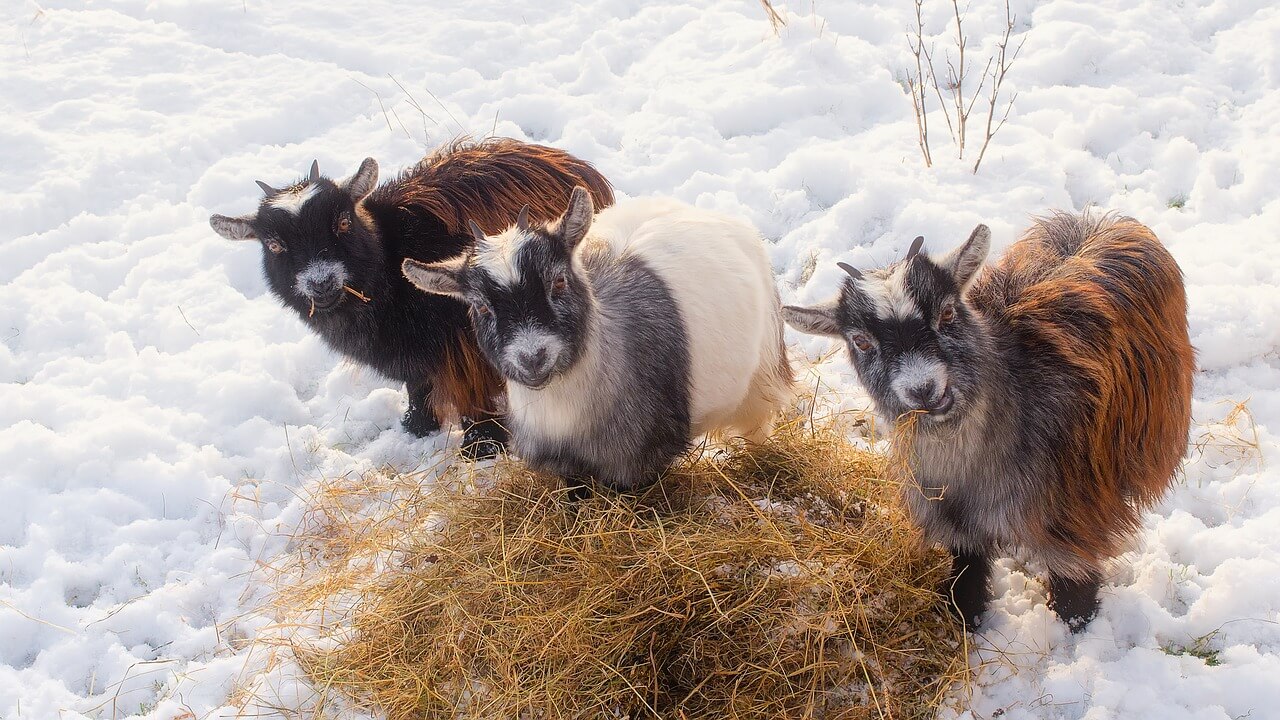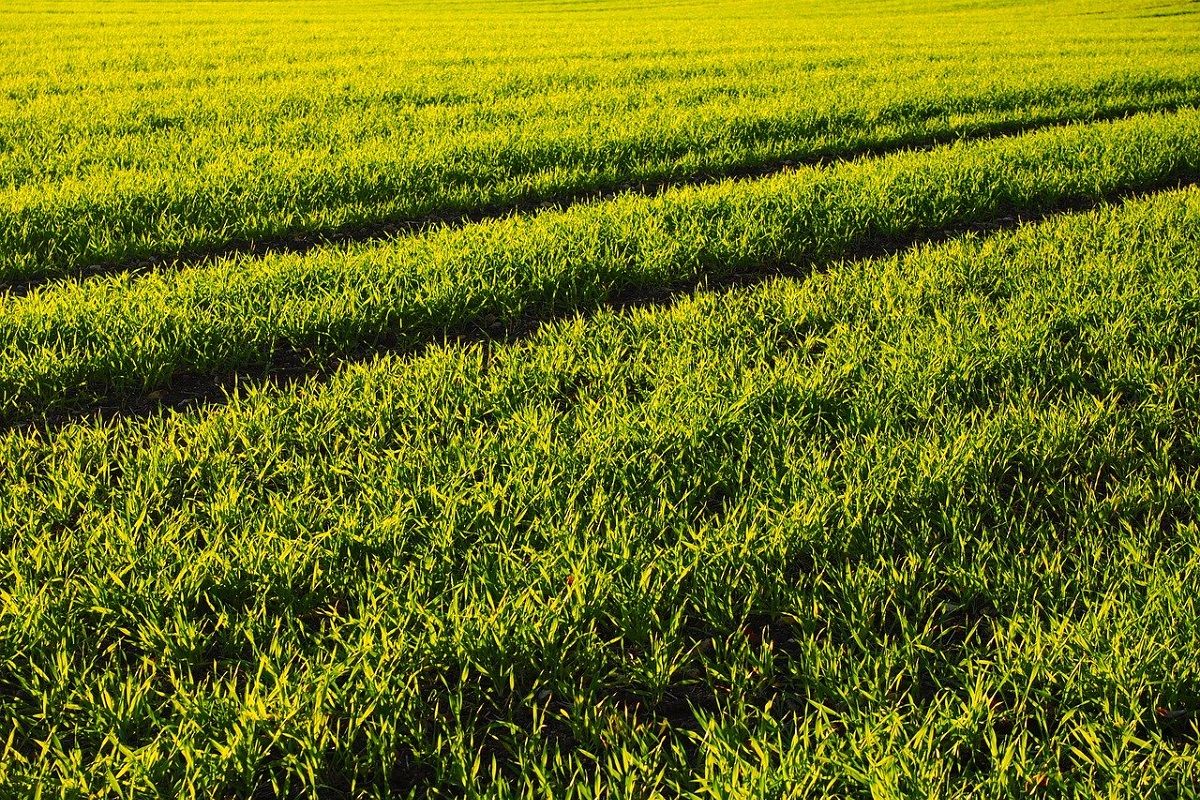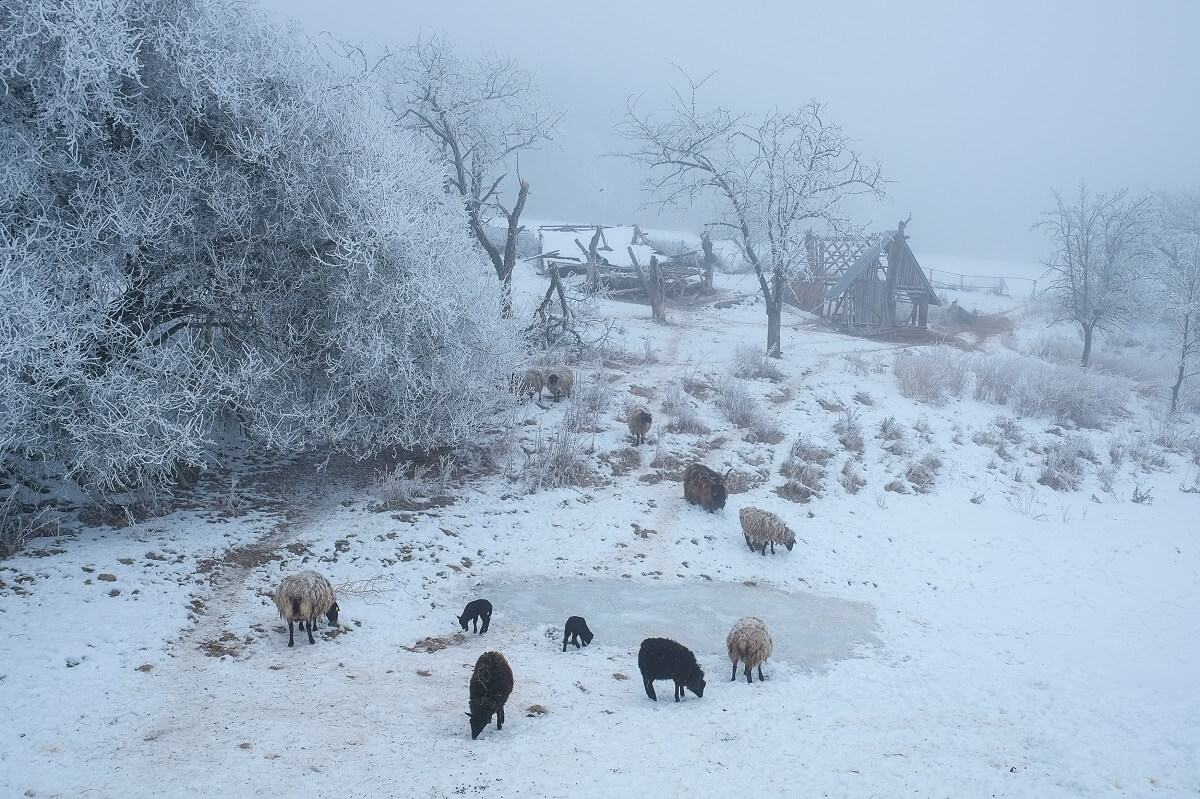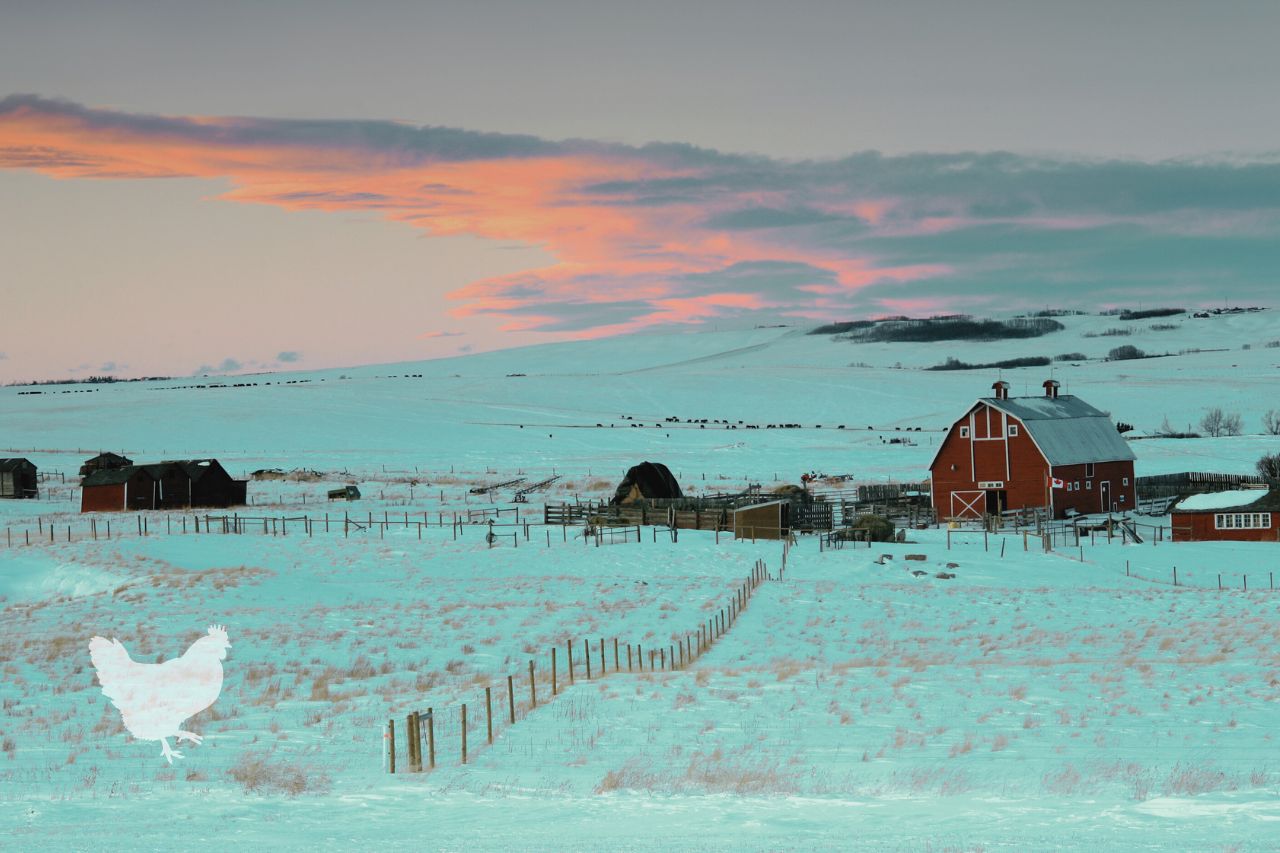Are you curious about how to maintain a farm during the winter? If so, this article should offer you all the information you need to know in order to be successful during those not-so-toasty periods of the year.
What You'll Learn Today
How Does Winter Affect Farming?

For some farmers, winter is a slow period, often considered a welcomed downtime when crops and livestock aren’t in “active production” states.
However, for many farmers, winter is just as labor-intensive (if not more so, since now all farm chores are being done under a blanket of snow!).
Once the crops have been harvested, that doesn’t mean a farmer’s work is done. The winter months are filled with all kinds of chores, including buying fertilizer, seed, and equipment, working on tools that may have fallen into disrepair, and budgeting and planning for the year ahead.
Winter presents several additional challenges for farmers. Not only will you have frozen fields and livestock waterers to worry about, but you’ll also need to plan ahead for adverse weather conditions.
Winter farming can be stressful for some because of this. However, with proper preparation, it doesn’t have to be overly taxing.
What Do You Do on a Farm in the Winter?
There are all sorts of tasks that need to be completed on a farm during the chillier months of the year. Much of what is on your to-do list will vary depending on where you live and what kind of farm you operate.
For vegetable farmers, it’s a good time of the year to review your crop insurance to figure out what might or might not be covered by harsh weather.
In warmer climates or for greenhouse growers, your winter farming tasks might also include caring for cold-weather crops like peas, asparagus, and Brussels sprouts.
If you raise livestock, there’s a good chance that your daily chores are just as intensive during the winter as they are in the summer. You’ll still need to conduct all the daily tasks like feeding, watering, and cleaning barns.
Of course, you’ll be doing this with snow and ice to contend with. You’ll have to put in some extra effort to make sure livestock water is thawed and that your animals are warm enough in their barns.
Winter farming presents additional challenges for farmers who still need to scrape pens and milk animals. You’ll have to worry about keeping diesel fuel tractors running in the cold and keeping extra feed supplies on hand.
Since your animals likely won’t be out on pasture, eating fresh grass and other forages, your feeding routine may become a bit more labor-intensive.
Chances are, your winter farming chore list is going to include a heck of a lot of shoveling, scraping, and salting, too!
Prior to the onset of winter weather, it’s also a good idea for livestock farmers to clear debris that could create hazards for animals when hidden under snow and ice.
You’ll also want to prepare a disaster plan and supply a kit with extra medications, food, and other equipment and supplies should winter weather knock out your electricity.
What Do Farmers Plant in the Winter?

If you’re new to winter farming, you might be wondering how, exactly, you’re going to fill your time.
The good news is that, if you raise livestock, you’ll be plenty busy just keeping them fed, watered, and warm!
However, even vegetable farmers will find something to do in cold winter weather. There are lots of vegetables you can plant even when temperatures drop below freezing.
Some of the best winter farming crops, depending on where you live, include:
- Winter lettuce
- Onions
- Garlic
- Peas and pea shoot
- Asparagus
- Broad beans
- Spring onions
- Shallots
- Brussels sprouts
- Broccoli
- Kale
- Cauliflower
- Cabbage
- Winter wheat
All of these crops can be grown over the winter, sometimes with the addition of a greenhouse or cold frame to provide a bit of supplemental heat (and protect against snow).
How Do Farmers Maintain Crops in Cold Weather?
For many farmers, it actually makes more sense to grow vegetables in cold winter weather than it does during the summer.
Without having intense heat and drought to contend with, winter farming might actually seem like a breeze to you!
Options for Growing Crops in the Winter
Using an unheated hoop house, a low tunnel, or even a heated greenhouse is a great way to protect your crops in cold weather.
It will allow you to control everything, including the humidity, temperature, and moisture.
The only challenge in growing in such an environment is that you might have to worry about fungal diseases on your crops.
When you are growing in this kind of environment in the winter, there’s naturally going to be less ventilation.
Caring for Plants in the Winter
To prevent fungal diseases, make sure your crops are properly spaced in your greenhouse. Water regularly but try to do so from below by using soaker hoses (but only if you’re working in a heated greenhouse to prevent the lines from freezing).
Otherwise, your chores in caring for winter crops will be more or less the same as what you’d have to do during the summer.
Even if you choose not to plant in a hoop house or greenhouse, you can still keep plants warm into the winter by covering them with row covers or applying a thick layer of mulch.
Tips for Caring for Livestock in the Winter

Many vegetables view the winter months as a rest period – a time to sit back, relax, and rest up for the next long season of production ahead.
But if you’re a livestock farmer, you know that this is not a reality. You still have animals to care for and they need to be fed and watered regardless of how cold it is outside.
Housing
Animals that are being raised in a closed barn during the winter still need some fresh air. Make sure you give them some time out on pasture each day, if possible, and be sure that the barn is adequately ventilated.
If your barns aren’t ventilated, it can increase the likelihood of respiratory diseases. In addition to ventilation, regular cleaning is a good idea, too.
You may wish to adopt a “deep litter” method of bedding for your animals during the winter months. This method is most commonly associated with chickens but can be used with all other kinds of livestock, too.
If you choose to deep bed your animals, it can help generate heat and will reduce your overall cleaning chores. You’ll just keep adding bedding atop the old stuff every day or every week (depending on your stocking densities).
Then, come spring, it can all be scraped out.
Feeding and Watering
Of course, it’s also important for you to put some thought into how you will meet the nutritional requirements for your animals (donkeys, goats, sheep, etc) during the winter months.
They’ll need all the calories and nutrients they did before – and then some, because winter is extra taxing.
Make sure you provide free choice minerals and salt along with plenty of hay and grain, spending on the species. Heat the water (either by using a heated watering trough or replacing it several times a day) so it’s always around 50 degrees.
Water is key even when the weather is cool – something so many farmers forget. They assume that dehydration isn’t as much of a risk in these kinds of conditions but the reality is that it is even more likely to occur in dry winter weather.
When it comes to keeping water from freezing, you will have plenty of options. Many people use heated tanks but these can be unreliable in the event of a power outage.
Take a look at the video below for more advice on this subject. It has tips on how to use heated waterers as well as ways to know whether your heaters are getting power (or if the GFCI outlet has tripped).
And once you’re done all your barn chores for the day?
Be sure to take care of yourself, since there’s a good chance you’ve caught a chill out there choring in the cold! Get inside and curl up with a mug of tea and a nourishing snack.
How Do Farmers Survive in Winter?
In addition to all of the tasks listed above, the winter months are a great time to reflect on what you’d like your farm to look like in the spring.
Wintertime is a great time to consider what you accomplished the year before and to think carefully about your plants for the future.
It can be difficult, however, when there is so much work that needs to be done and it’s hard to stay motivated through these cold days.
Consider implementing just one tip at a time as you consider everything that needs to be done.
By chipping away at your long list of chores, slowly but surely, you’ll make it through those dreary winter months. Stay warm!
And if you have a bit of time, here are some further maintenance tips for your farm.
Frequently Asked Questions

Why Should Farmers Prepare for Winter?
Preparing for the winter is extremely important if you live on a farm. Having a plan in place in case of bad weather, power outages, or other problems can help you make it through these challenging times.
It is always better to be prepared than to be caught without a plan. Spending time during the warmer months preparing for harsh winter conditions will help you get through the winter months more smoothly.
Is Winter a Good Time to Prepare Your Farm?
Winter is a great time to prepare your farm for the upcoming year. Because you may have fewer chores or more downtime, you can use that time constructively to plan ahead.
There are various things you can do to prepare your farm in winter: work on the budget, order supplies, repair equipment, and set goals for what you hope to accomplish in the upcoming year.
How Do You Prepare a Barn for Winter?
Since your farm animals are likely to spend a lot more time in the barn in winter, it’s important to prepare the barn for them ahead of time. Start by making sure all the doors, gates, and shutters open and close properly.
Stock up on supplies like sawdust or wood shavings for bedding. Make sure your hoses and water tanks don’t have any leaks. Check to make sure the feed room is clean and free of rodents. Taking these steps before it gets cold out will save you a lot of stress once winter hits.
How Do You Protect Farm Animals During the Winter?
Cold weather can put a lot of extra stress on farm animals. The best way to protect them is to be aware of their needs and to make sure you are meeting them.
Check water tanks and troughs frequently to make sure their water isn’t frozen, or consider using heated water tanks. Provide extra feed to help them stay warm. Clean their stalls regularly, providing plenty of fresh bedding, and make sure their stalls are well ventilated but sheltered and not drafty.
How Do You Keep Warm on a Farm During the Winter?
Finally, it’s important to keep yourself and your family warm during the winter. Make sure your furnace is properly maintained and in good working order. It’s also a good idea to have a backup power source available.
Keep the heat in your house by caulking windows, putting blankets up against doors, and using weather stripping as needed. Open cabinet doors to keep pipes from freezing during periods of extreme cold.
Do you think it can be profitable to install a heating system to keep cattle and poultries warm in the winter? And if yes, which one do you recommend?